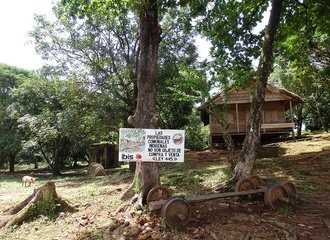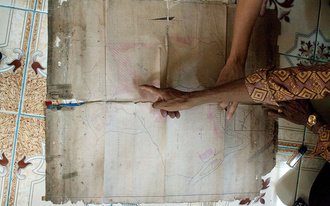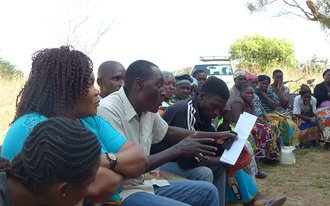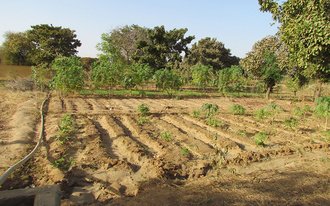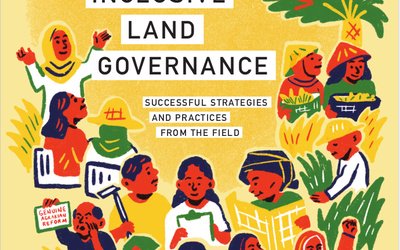Inclusive Land Governance
Both ENDS works with partners around the world to ensure that land is governed fairly and inclusively and managed sustainably with priority for the rights and interests of local communities.
Conflicts over land are common in many places around the world. The increasing demand of the global economy for minerals, natural resources, and primary products drive agribusinesses and mining companies into new areas in search of land. Where communities lack secure land (use) rights, the land they use is at risk of conflict, being allocated to or grabbed by large companies often with the support of local or national authorities. Land insecurity and dispossession poses a direct threat to people's livelihoods, right to food, health, access to water, social and cultural integrity, and identity.
Securing land (use) rights at all levels
Access to and control over land that is used by local communities is a fundamental part of inclusive land governance and sustainable land use practices. Sustainability means investing for the long term and, unfortunately, land-insecurity often prevents land users from doing so. Securing land (use) rights at the local, national and international level is therefore central to the discussions of sustainability, including sustainable trade & investments, ecosystem management, halting land degradation and deforestation and protecting biodiversity.
At the local level, land users (many of them women) and communities often lack formal recognition of their land (use) rights, despite having used and protected the land for generations. Both ENDS works with civil society organisations towards recognition of land (use) rights in policy processes, for example by community mapping, land use planning, advocacy towards local and national governments, and securing a seat for communities at local, national and international decision-making tables. At the same time, we support communities by putting collective, communal and women's land (use) rights on the international agenda, which is too often mainly focused on land use practices without taking into account the importance of land security.
Both ENDS and partner organisations have actively contributed in the development of the Voluntary Guidelines on the Responsible Governance of Tenure of Land, Fisheries and Forests in the Context of National Food Security (VGGT) by the UN Committee on World Food Security. Since the adoption of the VGGT by all UN Member States, we advocate for these guidelines to be implemented in national and international policies, such as the UNCCD's Strategic Framework and Dutch land-use policies.
Identifying and upscaling sustainable land use practices
Communities who depend on their natural environment for their livelihoods tend to use natural resources in a sustainable way, in order to secure their children's livelihoods. They have developed sustainable land-use practices, that are tailor-made for the local situation and needs. However, due to climate change these practices have to change, as the knowledge of natural systems has to adapt to new weather patterns, droughts and rainfall patterns. Where land (use) rights are insecure, due to land conflict with other users, communities tend to spend less time and resources in long-term investments in the land (e.g. planting trees, foster soil health, etc.) .
Therefore, Both ENDS together with partner civil society organisations – is committed to identifying sustainable, climate-resilient land use practices, like agroecology, Non Timber Forest Products, farmer-led restoration etc., in order to promote them, spread knowledge to other communities interested in these practices, and seek finance for implementation. At the same time, Both ENDS and partners speak with policy-makers at all levels about these sustainable alternatives to unsustainable practices and the enabling policy environment that is needed.
Examples of inclusive and sustainable land governance
Both ENDS and partner organisations have been advocating for and supporting inclusive and sustainable land governance initiatives for a long time. Some examples include:
• Participatory land use planning (PLUP):
In 2010 we started a pilot project on Participatory Land Use Planning in West-Kalimantan. We have shared our experiences with PLUP with other CSOs, policy makers and scholars and in various other projects and contexts.
• Farmer-Managed Natural Regeneration (FMNR):
This is a method of land restoration by nurturing what spontaneously springs from the soil and protecting the sprouts from cattle and hazards. Besides sharing knowledge of this method between communities, in our FMNR-projects we foster cooperation between farmers and pastoralists and advocate for responsible land governance with local and national authorities.
• Non-Timber Forest Products (NTFPs):
Harvesting and processing Non-Timber Forest Products such as fruits, nuts, honey, herbs or rattan is an important livelihood strategy for many forest communities. We work together with local communities to support the sustainable collection of NTFPs while also ensuring that local land (use) rights and forest management policies support secure communal land tenure and sustainable forest management.
Building an inclusive land justice movement
Both ENDS is committed to work towards land justice together with a wide and diverse network of civil society organisations. These organisations identify, promote, upscale and implement inclusive land governance and sustainable land-use practices, work with communities, and advocate towards their local and national governments. Both ENDS' expertise lies in building international networks of like-minded organisations, linking local realities to international policy arenas, and connecting civil society organisations with funders. Together we have the capacities, knowledge and skills needed to make global land justice a reality.
For more information
Read more about this subject
-
Dossier
Inclusive ways to sustainable and healthy food for all
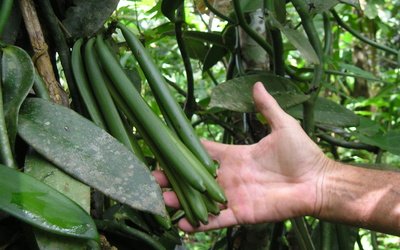
All around the world small-scale farmers are using sustainable and inclusive methods to produce food. Working together with nature and each other, they provide their families and communities with sufficient and healthy food. But their production methods are under pressure from large-scale agriculture and the globally dominant system of industrial food production. Together with our partners, Both ENDS is trying to turn the tide in favour of sustainable, local practices that are mostly known as 'agro-ecological' or 'nature-inclusive'. Why are we focusing on these methods? Agro-ecological practices are climate-proof and inclusive and increase the opportunities for communities around the world to produce their food sustainably.
-
Dossier
The merits of community-based restoration
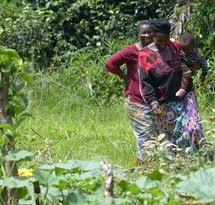
Globally, the area that is suffering desertification and land degradation is ever expanding. Unsustainable and often large-scale agricultural practices, including the copious use of pesticides and fertilisers, are a major driver of land degradation, aprocess that is further exacerbated by climate change, causing more erratic rainfall patterns, longer periods of drought and unpredictable growing seasons. This is very problematic not only for the hundreds of millions of people who directly depend on land and water for their livelihoods, but also for life on earth as a whole. It is clear that this process must be stopped and reversed, better sooner than later. But how to go about it?
-
Event / 2 March 2023, 14:00 - 15:30
Inclusive finance for land governance: A conversation with donors
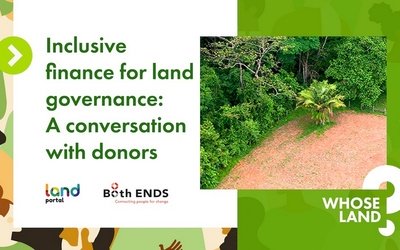
Both ENDS and the Land Portal Foundation invite you to the fourth webinar in the Whose Land? Inclusive Pathways to Land Governance series. This fourth Whose Land? webinar will focus on the question: How can donors fund land governance initiatives through an inclusive process?
More information about this event is available on Landportal.org
-
News / 10 May 2022
Lobbying for local and sustainable practices during the UNCCD summit
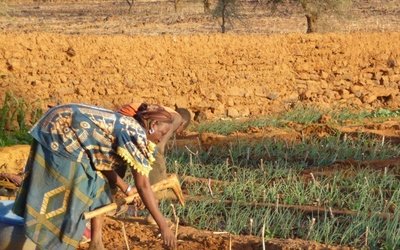
From May 9 to 20, the 15th Conference of the UN Convention to Combat Desertification, Land Degradation and Drought (UNCCD COP15) will take place in Abidjan, the capital of Côte d'Ivoire. Governments, policymakers, civil society organisations and scientists from countries all over the world will discuss the problems around drought, land degradation and desertification that are increasing. Colleagues Nathalie van Haren and Stefan Schüller will be there, as will a large number of representatives of organisations with which Both ENDS has been working together for decades. But what is the purpose of the meeting, what is discussed and why is it important to be present? We asked Nathalie and Stefan.
-
Event / 26 April 2022, 10:00 - 11:30
How can civil society actors ensure inclusivity in their land governance work with communities?
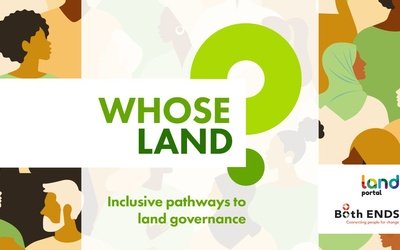
Both ENDS and the Land Portal Foundation invite you to the first webinar in the Whose Land? - Inclusive Pathways to Land Governance series, which aims to provide a platform for stakeholders engaged in land governance to exchange on the importance of inclusivity and meaningful participation of all relevant actors in both formal and informal land governance processes.
-
Publication / 8 January 2021
-
News / 16 August 2019
Opinion: "Sustainable land use needs radical policy change"
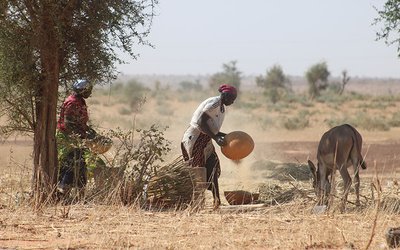
Today, an op-ed by Nathalie van Haren and Stefan Schüller was published in the Dutch national newspaper De Volkskrant about the IPCC's latest report "Climate Change and Land". Below you find the English translation.
-
News / 26 July 2018
Both ENDS and partners: recognize human rights in French strategy against imported deforestation
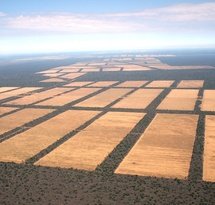
Both ENDS together with partners from Indonesia, Malaysia, Democratic Republic of Congo and the United Kingdom, filed a joint submission to the French Government on its draft National Strategy to Combat Imported Deforestation (Strategie Nationale de Lutte Contre la Deforestation Importee – "SNDI").
-
News / 28 June 2018
Indigenous leaders present 'Supply Chain Solutions' and petition in Paris and Brussels
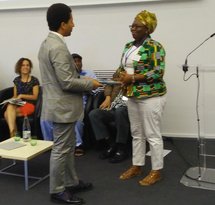
Last week, indigenous leaders from various countries were in Paris to urge action on deforestation and human rights abuses at the multi-stakeholder meeting of the Amsterdam Declarations Partnership. The group, invited by Forests Peoples Programme and Both ENDS, presented a publication 'Supply chain solutions for people and forests' containing a set of practical recommendations from local communities on how to make supply chains more sustainable and fair.
-
News / 28 February 2018
Human Rights defenders from all over the world visit EU to call for strong measures against deforestation
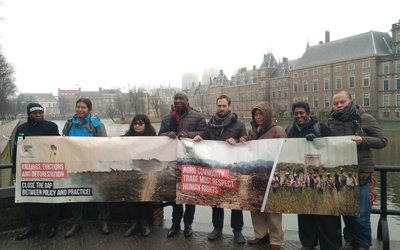
This week, from 12 until 16 February, fourteen indigenous leaders and human rights defenders from forest countries came to the Netherlands to call upon Dutch policy makers to take serious action against human rights abuses, land grabbing and further deforestation in relation to large scale agriculture, timber logging and mining. The Dutch harbours of Rotterdam and Amsterdam receive enormeous amounts of soy and palm oil, both for the Dutch market and for further transport into Europe and elswhere.
-
News / 28 November 2017
Ten years after ground-breaking ruling the Saramaka are still fighting for their rights
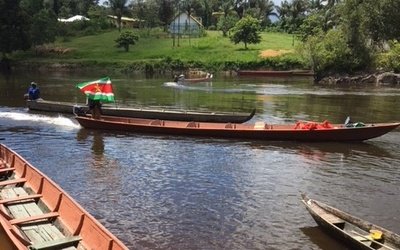
On 28 November 2007, the Saramaka people won a ground-breaking court case against Suriname at the Inter-American Court of Human Rights (IACHR). The Court ruling included the provision that Suriname could no longer grant concessions on tribal territory without the permission of the inhabitants. Ten years later, little has come of implementing this ruling in practice.
-
News / 24 October 2017
Both ENDS’ response to the Indonesian Sustainable Palm Oil National Action Plan
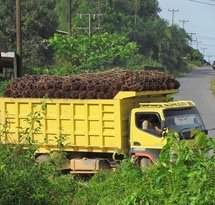
On 30 September 2017 Both ENDS submitted a position statement on the draft Indonesian Sustainable Palm Oil National Action Plan. The draft National Action Plan purports to represent a blue print for improving the sustainability of the Indonesian palm oil industry. However, Both ENDS has significant concerns about the logic, rationale and purpose behind the draft National Action Plan and its legitimacy as a benchmark for a sustainable palm oil industry.
-
News / 4 October 2017
Reaction to FMOs position statements on human rights, land and gender
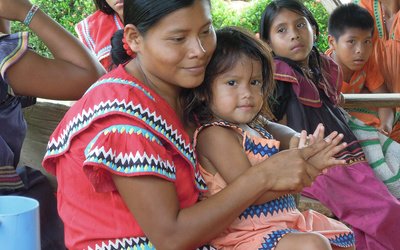
On September 20th FMO published its new position statements on human rights, land governance and gender. We appreciate that FMO takes human rights serious and applaud the efforts that have been made to come to an improved position on human rights, land and gender. However, to truly have a positive impact on people and the environment, some important follow up steps are necessary.
-
News / 28 September 2017
Both ENDS at UNCCD COP13: don’t forget about the people
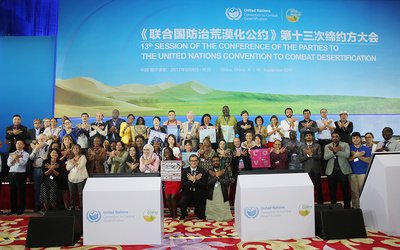
This September, Both ENDS participated at the 13th Conference of the Parties of the UNCCD in Ordos, Inner Mongolia in China. We were part of the Drynet delegation, a network of CSOs, to bring local realities to the international UNCCD discussions.
-
Blog / 25 September 2017
Bringing good practice to the UNCCD conference

Access to, ownership and control over land is inherently part of a successful implementation of land degradation neutrality (LDN) and sustainable land management. Sustainability often means investing for the long term, and insecurity withholds land users to do so. In particular women's land use rights are fundamental as they are the ones working on the land and thus putting LDN into practice.



